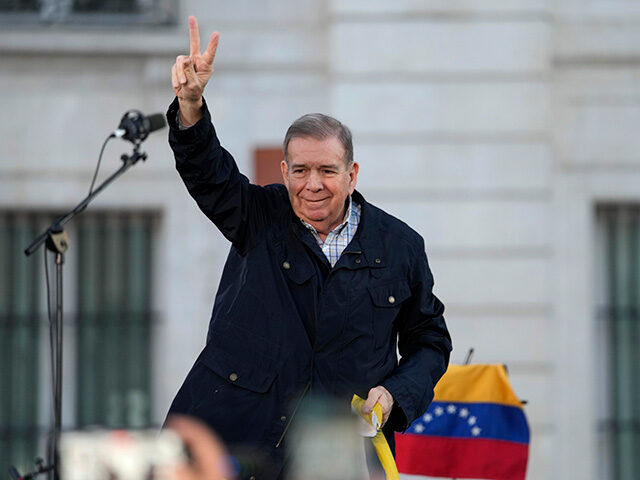The outgoing administration of U.S. President Joe Biden recognized Venezuelan ex-diplomat Edmundo González as “president-elect” of Venezuela for the first time on Tuesday.
The recognition acknowledges his victory against socialist dictator Nicolás Maduro in the fraudulent July 28 presidential election.
“The Venezuelan people spoke resoundingly on July 28 and made Edmundo González the president-elect. Democracy demands respect for the will of the voters,” Secretary of State Antony Blinken wrote on social media.
Venezuela’s socialist regime held a fraudulent presidential election on July 28 where dictator Nicolás Maduro — who appeared 13 times in the ballot — ran against a group of handpicked “opposition rivals” and González, a 75-year-old former diplomat. Venezuelan authorities, all loyal to Maduro, proclaimed the socialist dictator the “winner” of the election, refusing to publish voter data that can corroborate the claims as per Venezuelan law states.
The socialist regime’s continued refusal to publish the voter data prompted the international community to question the “results,” particularly after the Venezuelan opposition published voter data obtained from tallies nationwide on the day of the election that it claims can demonstrate González defeated Maduro in a landslide.
While the United States previously recognized González as the winner of the election, Blinken’s Tuesday message marks the first time the Biden administration refers to him as “President-elect” of Venezuela, four months after the election.
WATCH — Billboard of Maduro Set Ablaze Amid Venezuelan Election Protests:
According to Bloomberg, Blinken told partners about the decision to recognize González on the sidelines of the annual G20 summit, hosted by Brazil in the city of Rio de Janeiro this week. The move, according to Bloomberg, is designed to “increase pressure on Maduro” ahead of his upcoming inauguration on January 10, 2025, in which he is expected to be sworn in for an additional six-year term. Maduro secured his current term in another fraudulent election in 2018.
The aftermath of the election and the dictator’s fraudulent “victory” claims prompted Venezuelans to peacefully protest against the socialist regime. Maduro responded to the protest by unleashing a brutal persecution campaign that saw his regime once again commit crimes against humanity, according to U.N. experts. The experts estimated that the crackdown campaign left 27 dead and more than 2,400 detained — including dozens of children, some of whom were subject to torture and charged with “terrorism.”
González fled to Spain in early September shortly after the Maduro regime issued an arrest warrant against him on charges of “disobedience,” “conspiracy,” “usurpation of functions,” and “sabotage” charges.
The former diplomat thanked Blinken for his recognition as president-elect on social media, expressing that the Secretary of State’s gesture “honors our people’s desire for change and the civic gesture that we carried out together on July 28.”
Although currently in exile, González claimed to the Colombian new channel NTN24 on Tuesday that he intends to return to Venezuela on January 10 to be sworn in as president.
“My swearing-in will be in accordance with the Constitution of Venezuela, before the legislative bodies that are approved to carry out this swearing-in. Without a doubt,” González said.
The Maduro regime responded to Blinken’s recognition of González through Foreign Minister Yván Gil, who condemned the outgoing State Secretary’s “ridiculous” message in a post on his Telegram account in which he described Blinken as an “enemy of Venezuela” and González as “Guaidó 2.0.”
“‘The only place you don’t come back from is ridicule’ goes the popular saying. However Blinken, a confessed enemy of Venezuela, insists on doing it again, now with a Guaidó 2.0 supported by fascists and terrorists subordinated to the battered US policy,” Gil’s message reads.
“In the last days of his government, he should dedicate himself to reflect on his failures, get rid of the imperial and colonial complexes and go write the memoirs of how the Bolivarian Revolution made him bite the dust of defeat, just like his predecessors,” he continued. “The literary plan of yet another Secretary of State, who sank, together with his puppets, trying to reverse Venezuelan democracy, never fails.”
The fraudulent July 28 election occurred after Blinken spent years promoting the idea of legitimizing the authoritarian socialist regime by having Maduro agree to commit a “free and fair” election.

Venezuela’s President Nicolas Maduro points while meeting Colombia’s new ambassador to Venezuela, at the Miraflores Presidential Palace in Caracas, Venezuela, on August 16, 2023. (Ariana Cubillos/AP)
Under the observation of the Biden administration and Blinken, the Venezuelan opposition and the Maduro regime held yet another round of “negotiations” in 2023 that culminated with an agreement signed in Barbados in October 2023. The 2023 negotiations between the Maduro regime and the opposition were the latest in a long string of negotiation rounds that both sides have engaged in over the past two decades — none of which have yielded any progress towards restoring democracy in Venezuela.
The agreement called for Maduro to allow a “free and fair” election sometime in 2024. In exchange, President Biden gifted Maduro with a broad six-month-long oil and gas sanctions relief package that briefly allowed the state-owned PDVSA oil company to freely sell its oil and gas in U.S. and international markets.
The Biden administration also awarded Maduro with other generous concessions, such as releasing his top money launderer, Alex Saab in December 2023. At the time, Saab was undergoing trial proceedings in a U.S. court on charges of using the American financial system to launder $350 million from Venezuela’s state coffers.
Maduro did not uphold any of his vague promises and instead had his regime draft a tailor-made sham election plan for the July 28 election and launched a dissident crackdown campaign known as “Bolivarian Fury” ahead of the fraudulent electoral date.
Christian K. Caruzo is a Venezuelan writer and documents life under socialism. You can follow him on Twitter here.

COMMENTS
Please let us know if you're having issues with commenting.